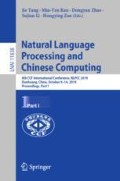Abstract
Automatic related work generation aims at producing a related work section for a given scientific paper. Demand for this task replacing a labor-intensive process has substantially increased in recent years. Considering the lack of an open and large-scale dataset for related work generation, we introduce NudtRwG (https://github.com/NudtRwG/NudtRwG-Dataset/), a collection of 2,084 document sets, each with a target paper, a ground truth related work, and the corresponding reference papers. To our knowledge, NudtRwG is the first open, large-scale and high-quality dataset for related work generation. The contribution of this work apart from the dataset is two-fold: firstly, we present a detailed description of the data collection procedure along with an analysis on the characteristics of the dataset; secondly, we conduct an analytical study, investigating the effects of summative sections (abstract, introduction and conclusion) and other sections of reference papers on related work generation. Experiments reveal that the two parts are equally important and other sections should not be ignored. When generating a related work section, researchers should consider not only summative sections, but also other sections of reference papers.
Access this chapter
Tax calculation will be finalised at checkout
Purchases are for personal use only
References
Chen, J., Zhuge, H.: Automatic generation of related work through summarizing citations. Concurrency Comput. Pract. Exp. 31(3), e4261 (2016)
Cohan, A., Goharian, N.: Scientific document summarization via citation contextualization and scientific discourse. Int. J. Digit. Libr. 19(2–3), 287–303 (2018)
Erkan, G., Radev, D.R.: Lexrank: graph-based lexical centrality as salience in text summarization. J. Artif. Intell. Res. 22, 457–479 (2004)
Gillick, D., Favre, B.: A scalable global model for summarization. In: Proceedings of the Workshop on Integer Linear Programming for Natural Langauge Processing, pp. 10–18. Association for Computational Linguistics (2009)
Haghighi, A., Vanderwende, L.: Exploring content models for multi-document summarization. In: Proceedings of Human Language Technologies: The 2009 Annual Conference of the North American Chapter of the Association for Computational Linguistics, pp. 362–370. Association for Computational Linguistics (2009)
Hoang, C.D.V., Kan, M.Y.: Towards automated related work summarization. In: Proceedings of the 23rd International Conference on Computational Linguistics: Posters, pp. 427–435. Association for Computational Linguistics (2010)
Hong, K., Conroy, J.M., Favre, B., Kulesza, A., Lin, H., Nenkova, A.: A repository of state of the art and competitive baseline summaries for generic news summarization. In: LREC, pp. 1608–1616 (2014)
Hu, Y., Wan, X.: Automatic generation of related work sections in scientific papers: an optimization approach. In: Proceedings of the 2014 Conference on Empirical Methods in Natural Language Processing (EMNLP), pp. 1624–1633 (2014)
Jaidka, K., et al.: The computational linguistics summarization pilot task (2014)
Jha, R., Finegan-Dollak, C., King, B., Coke, R., Radev, D.: Content models for survey generation: a factoid-based evaluation. In: Proceedings of the 53rd Annual Meeting of the Association for Computational Linguistics and the 7th International Joint Conference on Natural Language Processing (Volume 1: Long Papers), vol. 1, pp. 441–450 (2015)
Lin, C.Y.: Rouge: a package for automatic evaluation of summaries. Text Summarization Branches Out (2004)
Mohammad, S., et al.: Using citations to generate surveys of scientific paradigms. In: Proceedings of Human Language Technologies: The 2009 Annual Conference of the North American Chapter of the Association for Computational Linguistics, pp. 584–592. Association for Computational Linguistics (2009)
Nenkova, A., Vanderwende, L.: The impact of frequency on summarization. Microsoft Research, Redmond, Washington, Technical report MSR-TR-2005 101 (2005)
Peyrard, M., Eckle-Kohler, J.: A general optimization framework for multi-document summarization using genetic algorithms and swarm intelligence. In: Proceedings of COLING 2016, the 26th International Conference on Computational Linguistics: Technical Papers, pp. 247–257 (2016)
Qazvinian, V., Radev, D.R.: Scientific paper summarization using citation summary networks. In: Proceedings of the 22nd International Conference on Computational Linguistics-Volume 1, pp. 689–696. Association for Computational Linguistics (2008)
Qazvinian, V., Radev, D.R., Mohammad, S.M., Dorr, B., Zajic, D., Whidby, M., Moon, T.: Generating extractive summaries of scientific paradigms. J. Artif. Intell. Res. 46, 165–201 (2013)
Wang, P., Li, S., Wang, T., Zhou, H., Tang, J.: Nudt@ clscisumm-18. In: BIRNDL@ SIGIR, pp. 102–113 (2018)
Wang, Y., Liu, X., Gao, Z.: Neural related work summarization with a joint context-driven attention mechanism. In: Proceedings of the 2018 Conference on Empirical Methods in Natural Language Processing, pp. 1776–1786 (2018)
Widyantoro, D.H., Amin, I.: Citation sentence identification and classification for related work summarization. In: 2014 International Conference on Advanced Computer Science and Information System, pp. 291–296. IEEE (2014)
Yasunaga, M., Kasai, J., Zhang, R., Fabbri, A.R., Li, I., Friedman, D., Radev, D.R.: ScisummNet: a large annotated corpus and content-impact models for scientific paper summarization with citation networks (2019)
Acknowledgements
The research is supported by the National Key Research and Development Program of China (2018YFB1004502) and the National Natural Science Foundation of China (61532001, 61303190).
Author information
Authors and Affiliations
Corresponding author
Editor information
Editors and Affiliations
Rights and permissions
Copyright information
© 2019 Springer Nature Switzerland AG
About this paper
Cite this paper
Wang, P., Li, S., Zhou, H., Tang, J., Wang, T. (2019). An Analytical Study on a Benchmark Corpus Constructed for Related Work Generation. In: Tang, J., Kan, MY., Zhao, D., Li, S., Zan, H. (eds) Natural Language Processing and Chinese Computing. NLPCC 2019. Lecture Notes in Computer Science(), vol 11838. Springer, Cham. https://doi.org/10.1007/978-3-030-32233-5_33
Download citation
DOI: https://doi.org/10.1007/978-3-030-32233-5_33
Published:
Publisher Name: Springer, Cham
Print ISBN: 978-3-030-32232-8
Online ISBN: 978-3-030-32233-5
eBook Packages: Computer ScienceComputer Science (R0)


